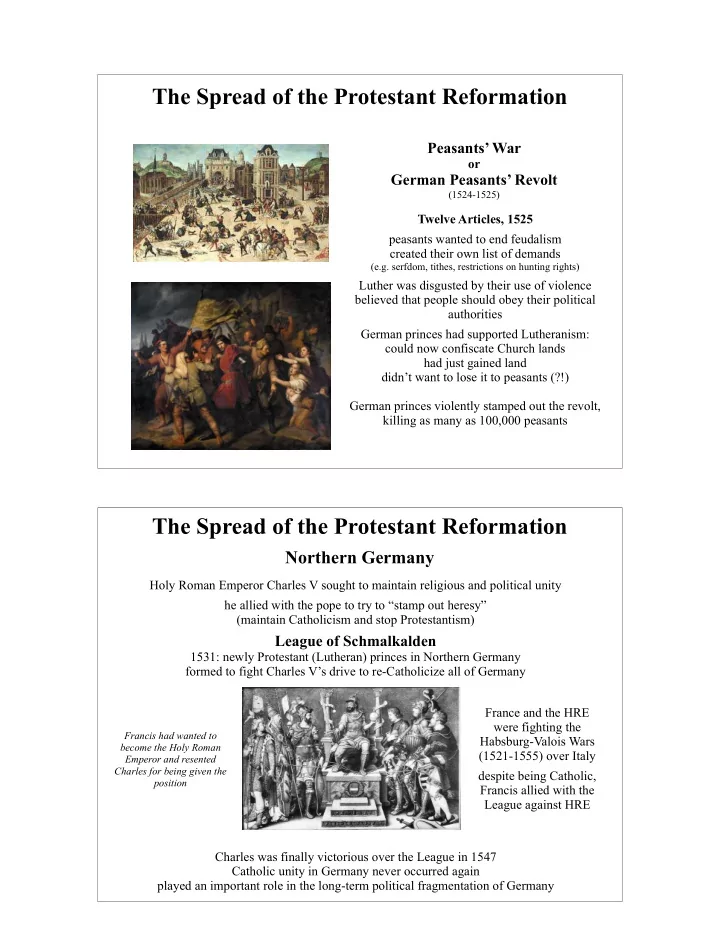

The Spread of the Protestant Reformation Peasants’ War or German Peasants’ Revolt (1524-1525) Twelve Articles, 1525 � peasants wanted to end feudalism created their own list of demands (e.g. serfdom, tithes, restrictions on hunting rights) � Luther was disgusted by their use of violence believed that people should obey their political authorities � German princes had supported Lutheranism: could now confiscate Church lands had just gained land didn’t want to lose it to peasants (?!) � German princes violently stamped out the revolt, killing as many as 100,000 peasants The Spread of the Protestant Reformation � Northern Germany Holy Roman Emperor Charles V sought to maintain religious and political unity � he allied with the pope to try to “stamp out heresy” (maintain Catholicism and stop Protestantism) � League of Schmalkalden 1531: newly Protestant (Lutheran) princes in Northern Germany formed to fight Charles V’s drive to re-Catholicize all of Germany France and the HRE � were fighting the Francis had wanted to Habsburg-Valois Wars become the Holy Roman (1521-1555) over Italy Emperor and resented � Charles for being given the despite being Catholic, position Francis allied with the League against HRE Charles was finally victorious over the League in 1547 Catholic unity in Germany never occurred again played an important role in the long-term political fragmentation of Germany
The Spread of the Protestant Reformation � Peace of Augsburg (1555) Temporarily ended the struggle in Germany over Lutheranism � Provisions: � Princes in Germany could choose either Protestantism or Catholicism � Protestants living in Catholic states were allowed to move to Protestant states and vice- versa. Resulted in permanent religious division of Germany The Spread of the Protestant Reformation � Anabaptists Zurich, Switzerland � 1525: voluntary group formed as an association of believers � refused to take civil oaths, pay taxes, hold public office, or serve in the military � did not believe in childhood baptism � believed the end of the world was near � 1532: John of Leiden led a radical Anabaptist group that took control of the German city of Münster � polygamy was instituted (John had 16 wives) � some women served as leaders of the movement � all books except the Bible were burned � killed some Lutherans and Catholics John of Leiden and several other prominent Anabaptist leaders were captured and imprisoned. In January 1536 John of Leiden and � two other followers were tortured and executed in the 1534: marketplace of Münster. Their dead bodies were exhibited in combined Protestant/Catholic army retook Münster cages, which hung from the steeple of St. Lambert's Church; the cages still hang there, though the bones were removed later. � executed Anabaptist leaders
The Spread of the Protestant Reformation � Ulrich Zwingli Zwingli adopted Lutheranism and became a pastor in Zurich in 1518 � attacked the custom of fasting during Lent saw the Eucharist as only symbolic � promoted clerical marriage introduced a new communion liturgy in 1525 to replace the usual mass � established what amounted to a theocracy in Zurich removed statues, paintings, altars, bones of local saints, etc. Colloquy of Marburg (1529) Zwingli officially split with Luther over issue of Eucharist The Spread of the Protestant Reformation � John Calvin Frenchman who studied the priesthood and law in France was threatened with arrest after writing a controversial attack on Paris Catholics wrote the Institutes of the Christian Religion in Geneva in 1536 � believed in predestination: the belief that God already knows who is saved � “good works” is not what gets someone into heaven they are a sign that one has been chosen for salvation � God reveals if one has been chosen for salvation by a “conversion experience” � church members who have had their conversion experience are known as the “elect” they become model Christians, or “visible saints”
The Spread of the Protestant Reformation � Calvinism � by 1540 Calvin had established a theocracy in Geneva: only Calvinists were allowed to live there Calvinism became the most militant and uncompromising of all Protestant sects � the Consistory: lay elders called presbyters who acted as judges had the power to impose harsh penalties for those who did not follow God’s law (Calvinism) � activities such as drinking, singing, dancing, usury, and gambling were expressly prohibited Protestant Work Ethic: emphasized the importance of hard work pointed to the financial success that often accompanied it as a sign that it pleased God � Calvinism had a far greater impact on future generations than Lutheranism: � Scotland: Presbyterianism (a Calvinist spin-off) became the dominant religion � France: French Calvinists called Huguenots � England: Puritans � did not spread to Ireland, Spain, or Italy (heavily Catholic) Reformation Europe (Late 16 c )
Recommend
More recommend